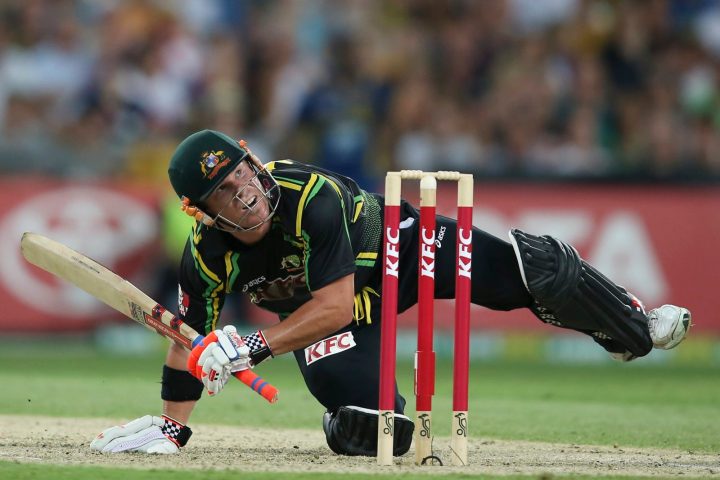Sport
Cricket: David Warner and the new challenges of media managers

David Warner’s recent Twitter outburst, directed at two Australian journalists, has put sportsmen and their Tweets in the spotlight yet again. Media managers face a whole extra challenge these days, and it’s becoming clear that players might need social media training alongside their traditional churn-out-these-clichés-in-press-conferences training. BY ANT SIMS.
When journalists gather for a press conference, they can take a pretty educated guess at what they’re going to get: Players want to focus on their processes to make sure the team does well, and they will never underestimate the opposition. It’s pretty straight-forward stuff, until once in a while somebody like Kevin Pietersen comes along and launches into a bizarre tirade.
Twitter is a bit different. Australian cricketer David Warner isn’t one to mince words. He minces his spelling quite often, but not the sentiment – and over the weekend he got into an expletive-laden spat with cricket writer Malcolm Conn. The exchange came as a result of a story written by another cricket journalist, Robert Craddock, who criticised the IPL, focusing on corruption in the tournament. The article featured a picture of Warner even though he hadn’t been linked to any of the recently exposed controversy. It’s that picture which reportedly sent Warner’s emotions into overdrive.
“All you do is bag people for a living and you say cricket [isn’t] a real job,” and “Keep writing paper talk trash for a living, champ, only thing you will ever do” are just some of the things that Warner spewed forth. He also added a few “Old fart, nobody buys your paper” jibes. From the outside, it was something quite extraordinary.
Cricket Australia has called the behaviour “unbecoming” and Warner will face a disciplinary hearing for breaking the code of conduct.
Warner is not the first and won’t be the last player to act in an “unbecoming” way on social networks. South African Jacques Kallis voiced his views on the death penalty a few months ago, while many other sportsmen have made foul jokes which landed them in trouble with the media and fans alike.
Toulon fullback Delon Armitage also had a lapse of judgement this weekend after he responded to former England hooker Brian Moore’s criticism by saying: “‘nytime you fat p****! Go write another s*** book.” He wrote this in reference to Moore’s award-winning autobiography Beware of the Dog. He has since deleted the Tweet, just like Warner has now deleted his messages to Conn.
It’s a bit of a Catch22. Social media makes players human, reachable and a bit more “real”; the presence gives them personality and sometimes a blip in common sense actually increases their popularity. Warner gained as many as 7,000 followers after his rather bitter reaction, but Mike Sharman, CEO of Retroviral Digital Communications, believes that this is all to be expected.
“We have a voyeuristic addiction to social media and meltdowns/outbursts in particular. It’s like a fight in a school yard – punches are thrown and a crowd gathers. Reports of the Warner/journalist conflict will have spread via a few Retweets and the mob is drawn to the altercation like a moth to an IPL floodlight. People follow because they want to see what happens next. Social media is our live soap opera,” Sharman told The Daily Maverick.
“Seeing celebrities deconstruct justifies the mere mortal emotions that we face on a daily basis but never get to witness… except when someone has a social media meltdown.”
While Warner didn’t exactly self-destruct, he certainly raised a few eyebrows. And this does raise the question of whether players need social media training.
Many Tweets are posted in the heat of the moment, when emotions take over and logical thinking goes out the window. But this alternative view of sporting heroes, Sharman believes, is a good thing.
“I think it’s a great thing because our sporting idols are real people. We’ve seen the dangers of putting stars on pedestals – you know the local star I’m referring to.
“Not all professional sportsmen were gifted from the age of three or four and the more young kids realise that hard training can lead to a professional career, the more kids will invest their time in sport. It has great lessons in discipline and hard work and I sound like a geriatric, but I support anything that gets more kids involved in gamesmanship and sport,” he said.
Sharman believes that additional media training is equally important, especially since players have become brands in their own rights and players cannot be disassociated form their brands (either the personal brands, sponsors or cricket teams).
“Players are under more scrutiny than ever before; they are multi-dimensional brands with the various followings that they have garnered across a range of social profiles. Their value add to brands is also higher if they have millions of engaged fans and followers.
“By engaging in social media, players have opened themselves up to greater criticism – from armchair critics to journalists, as David Warner can attest to – and it is something that traditional media trainers would not have been privy to in the past. What happens once the cameras are off and the pressers are complete requires more input from agents and handlers to coach the players through best practice social media etiquette.”
While Warner could have done with somebody telling him to not be so brutish, his outburst raised another talking point. As picked up by that bastion of weekly cricket writing The Spin, the issue is that of cricketers who feel contempt for those who do not play the game but opt to write about it or comment on it.
Commentary teams have to date been riddled with talking heads who can walk into almost any commentary job based on their Test match credentials, but sport is taking a different route and increasingly employing people who didn’t necessarily make it to Test or professional cricketing level.
Russell Domingo, Gary Kirsten’s successor, never played any cricket. When he failed to make the grade at provincial cricket, Domingo instead opted for behind the scenes work and picked up his first qualification at the age of 22.
But cricket calling upon those from outside the playing arena is nothing new. England called on a former maths teacher to run its statistical analysis, Australia has a rugby union player and coach as General Manager, and New Zealand has a head coach who never played a first-class game.
The problem arises when things start going wrong. When the going got tough for Australia in India a few months ago, former Aussie cricketer and current TV pundit Shane Warne called Howard a “muppet” and snapped: “Can CA please put current cricket people in charge?” Damien Martyn, for his part, asked: “I wonder how many Test matches Pat Howard played in India?”
Of course everybody is entitled to their own opinion (even if they can’t spell). But there are some things better left unsaid in the public domain, out of common courtesy.
One can only hope that sometime soon somebody realises perhaps a little bit of extra training is needed – for those who currently play and those who used to play the game.
After all, it’s not much different to somebody working for a big-name company spilling over into a social media meltdown, is it? It doesn’t look pretty, and it’ll get you fired or at least a stern warning in some cases. For sportsmen – past and present – it shouldn’t really be any different. DM
Photo: Australia’s David Warner hits a six off the bowling of Sri Lanka ‘s captain Angelo Mathews during their Twenty/20 international cricket match at the Homebush Stadium January 26, 2013. REUTERS/Steve Christo


















 Become an Insider
Become an Insider